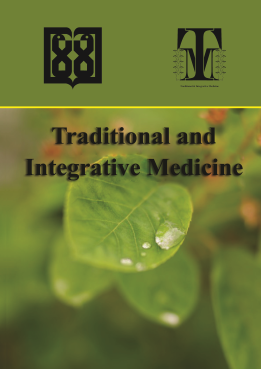Long-Term Ice-Cold Water Drink Induced Testicular Damage and Altered Sperm Characteristics in Rats
Abstract
An inappropriate lifestyle and nutritional habits such as high fat, high calorie food intake and quality of drinking water can change sperm parameters. Despite the fact that there are different and sometimes contradictory beliefs about the suitable temperature for drinking water, unfortunately, there is not much proven evidence. There are some long-term adverse effects of cold-water intake like liver, gastrointestinal and other internal organ damages and dysfunction. Regarding the high consumption of ice-cold water as a beverage and its probable role for infertility based on some trivial evidence and clinical senses, evaluation of the effects of ice-cold water drinking on reproductive system is noteworthy. Therefore, the main aim of this study is to assess the effect of long-term drinking of ice-cold water on the sperm count, morphology and motility and testis histology. Twenty-four male Wistar rats randomly divided into four groups (n = 6): Intervention groups that used ice-cold water (4oC) for two months (CW2M), three months (CW3M), two months ice-cold water and then one-month room-temperature water (CW2M + 1MRW), and control group that used room-temperature water. Spermatogram and histology of testis were assessed. Ice-cold water drink for the long run, reduced sperm count and sperm progressive motility; increased the percentage of non-motile sperm; changed normal morphology of sperm and destroyed Sertoli and Leydig cells. In conclusion, long-term ice-cold water drinking ought to be noxious for testis function and structure.
Tuttelmann F, Ruckert C, Ropke A. Disorders of spermatogenesis: Perspectives for novel genetic diagnostics after 20 years of unchanged routine. Med Genet 2018;30:12-20.
Vander Borght M, Wyns C, Fertility and infertility: Definition and epidemiology. Clin Biochem 2018;62:2-10.
Smith R, Kaune H, Parodi D, Madariaga M, Rios R, Moraler I, Castro A. Increased sperm DNA damage in patients with varicocele: relationship with seminal oxidative stress. Hum Reprod 2005;21:986-993.
Okabe M, Ikawa M, Ashkenas J. Male infertility and the genetics of spermatogenesis. Am J Hum Genet 1998;62:1274-1281.
Eslamian G, Amirjannati N, Rashidkhani B, Sadeghi MR, Hekmatdoost A. Intake of food groups and idiopathic asthenozoospermia: a case-control study. Hum Reprod 2012; 27: 3328-3336.
Pushpalatha T, Srinivas M, Sreenivasula Reddy P. Exposure to high fluoride concentration in drinking water will affect spermatogenesis and steroidogenesis in male albino rats. Biometals 2005;18:207-212.
Sharpe RM. Environmental/lifestyle effects on spermatogenesis. Philos Trans R Soc Lond B Biol Sci 2010;365:1697-1712.
Hayden RP, Flannigan R, Schlegel PN. The Role of Lifestyle in Male Infertility: Diet, Physical Activity, and Body Habitus. Curr Urol Rep 2018;19:56.
Skoracka K, Eder P, Lykowska-Szuber L, Dobrowolska A, Krela-Kazmierczak I. Diet and Nutritional Factors in Male (In)fertility-Underestimated Factors. J Clin Med 2020;9:1400.
Attia YA. Responses of the Fertility, Semen Quality, Blood Constituents, Immunity and Antioxidant Status of Rabbit Bucks to Type and Magnetizing of Water. Vol 15. Annals of animal science 2015; No. 1 pp 387-407. No. 2 p 21.
Salas-Huetos A, Bulló M, Salas-Salvadó J. Dietary patterns, foods and nutrients in male fertility parameters and fecundability: a systematic review of observational studies. Hum Reprod Update 2017;23:371-389.
Leisegang K, Dutta S. Do lifestyle practices impede male fertility?. Andrologia 2020:e13595.
Nimrouzi M, Tafazoli V, Daneshfard B, Zare M. Optimal fluid intake in daily diet: Avicenna's view. J Integr Med 2016;14:241-244.
Avicenna. The canon of medicine. Great Books of the Islamic World. Chicago 1999; p 4.
Saeedy SAG, Faisal Faiz A, Nikbakhtzadeh M, Minaei Zangi B, Keshavarz M. Adverse Effects of Long-Term Ice-Cold Water Drink on Rat Liver Function and Histology. Trad Integr Med 2020;5:107-113.
Deane M, Swan SH, Harris JA, Epstein DM, Neutra RR. Adverse pregnancy outcomes in relation to water consumption: a re-analysis of data from the original Santa Clara County Study. Epidemiology 1992;3:94-97.
Jafari P, Mojahedi M, Zareiyan A, Mokaberinejad R, Chaichi Raghimi M, Hakimi F, Parsa E. Water Intake from the Points of View of Rhazes and Avicenna. Complement Med Res 2019;26:126-132.
Emami NH, Lafout FM, Mohammadghasemi F, Administration of melatonin protects against acetylsalicylic acid-induced impairment of male reproductive function in mice. Iran J Basic Med Sci 2018;21:124.
World Health Organization D. WHO laboratory manual for the examination and processing of human sperm. World Health Organiz 2010.
O'Connell M, McClure N, Lewis SEM, The effects of cryopreservation on sperm morphology, motility and mitochondrial function. Hum Reprod 2002;17:704-709.
Jack W. McAninch M. FACS. Smith General urology 2008.
Muthusami K, Chinnaswamy P, Effect of chronic alcoholism on male fertility hormones and semen quality. Fertil Steril 2005;84:919-924.
Oyeyipo IP, Raji Y, Emikpe BO, Folashade Bolarinwa A. Effects of nicotine on sperm characteristics and fertility profile in adult male rats: a possible role of cessation. J Reprod Infertil 2011;12:201-207.
Budin SB. Low-dose Nicotine Exposure Induced the Oxidative Damage of Reproductive Organs and Altered the Sperm Characteristics of Adolescent Male Rats. Malays J Med Sci 2017;24:50-57.
El Ouazzani T. Thermoreceptors in the digestive tract and their role. J Auton Nerv Syst 1984;10:246-254.
Carlson NR. Physiology of Behavior 2010.
Salata RA, Verbalis JG, Robinson AG, Cold Water Stimulation of Oropharyngeal Receptors in Man Inhibits Release of Vasopressin. J Clin Endocrinol Metab 1987;65:561-567.
Widmark A, Damber JE, Bergh A, Arginine-vasopressin induced changes in testicular blood flow. Int J Androl 1991;14:58-65.
Glover TD, Young DH. Temperature and the Production of Spermatozoa. Fertil Steril 1963; 14:441-450.
Hiroyama M, Aoyagi T, Fujiwara Y, Birumachi J. Hypermetabolism of Fat in V1a Vasopressin Receptor Knockout Mice. Mol Endocrinol 2007;21:247-258.
Schoeller EL, Albanna G, Frolova AI, Moley KH. Insulin rescues impaired spermatogenesis via the hypothalamic-pituitary-gonadal axis in Akita diabetic mice and restores male fertility. Diabetes 2012;61:1869-1878.
| Files | ||
| Issue | Vol 5, No 4, 2020 | |
| Section | Research Article(s) | |
| DOI | https://doi.org/10.18502/tim.v5i4.5163 | |
| Keywords | ||
| Lifestyle Ice-cold water Testis Spermatogram Sertoli cells Leydig cells | ||
| Rights and permissions | |

|
This work is licensed under a Creative Commons Attribution-NonCommercial 4.0 International License. |




